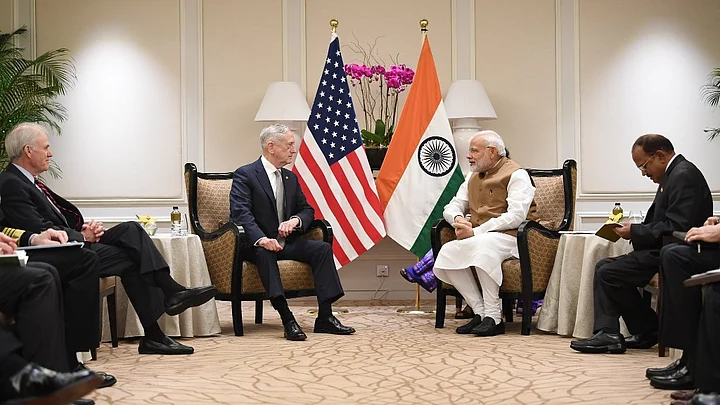US Defence Secretary James Mattis has praised Prime Minister Narendra Modi for speaking about massive debts, saying he made a really good point about the dangers of accepting loans that are "too good to be true".
Mattis met the Indian prime minister on the sidelines of the International Institute for Strategic Studies’ 17th Asia Security Summit – also known as the Shangri-La Dialogue – in Singapore on Saturday, 2 June. Prime Minister Modi delivered the keynote address at the annual conference.
Mattis told reporters on his way back home from Singapore on 3 June:
He (Modi) made a really good point there about the dangers of accepting loans that are too good to be true, and being forced into another agenda.
"I remember India (Modi), that speech. It was like listening to one of those old-timey people. I thought he was really great, and you know just hammering home. I really liked his point about massive debt," Mattis said.
“Massive debt — and I was thinking that night after I went back to my room, you could lose your sovereignty and your freedom from debt more than a soldier with a bayoneted rifle, you know? You can lose it economically instead,” the US Defence Secretary said.
Modi had criticised governments that put other nations under “impossible burdens of debt”, in a likely reference to China for its behaviour in the disputed South China Sea and its Belt and Road Initiative infrastructure projects which involves giving loans to other countries.
China has given massive loans to countries like Sri Lanka and Pakistan which, according to reports, have become a burden on them.
"They must empower nations, not place them under impossible debt burden. They must promote trade, not strategic competition. On these principles, we are prepared to work with everyone," Modi said.
Responding to a question, if Mattis would be invited to China after his strong remarks against them at Singapore, he said, he is still going there.
I’m still certainly going to China. They’re entitled to their view. I saw them at lunch yesterday, which would have been after I spoke, and we enjoyed our Coca-Cola together, and we talked. Nothing adversarial at all.US Defence Secretary James Mattis
Meanwhile in Washington, Pentagon spokesperson Captain Jeff Davis said on 3 June that India and the US have pledged to continue their strong bilateral strategic partnership and affirmed their commitment to maintaining peace, stability and prosperity in the region.
What Modi-Mattis Said in the Keynote Address
In his keynote address at the Dialogue, Modi had said an "Asia of rivalry" will hold the region back while an Asia of cooperation will shape the current century.
Asia and the world will have a better future when India and China work together with trust and confidence while being sensitive to each other's interests, he had said.
We should all have equal access as a right under international law to the use of common spaces on sea and in the air that would require freedom of navigation, unimpeded commerce and peaceful settlement of disputes in accordance with international law.PM Modi at the Shangri-La Dialogue
Mattis also addressed the dialogue where he stressed upon freedom for all and "reaffirmation for rule based order".
The meeting between the two leaders assumes significance as in his address Mattis has stressed upon both countries working together and with other nations for ensuring peace and security in the Indo-Pacific region.
"It is only appropriate that waterways remain open for all nations," Mattis said.
The meeting comes days after the US renamed its oldest and largest military command - the Pacific Command - to Indo-Pacific Command, amid heightened tensions with China over the militarisation of the South China Sea.
The US move came in the wake of a series of measures by China that have raised tensions in the South China Sea.
China claims almost all of the South China Sea. Vietnam, Philippines, Malaysia, Brunei and Taiwan have counter claims over the area. The US also rejects China's claims of ownership of the area.
The Pentagon's move is also reflective of the growing importance of India in US strategic thinking.
India was granted the 'Major Defence Partner' status by the previous Barack Obama Administration, providing for transfer of technology and deeper cooperation in the defence sector.
In 2016, India and the US had signed a crucial logistics defence pact enabling their militaries to use each other's assets and bases for repair and replenishment of supplies, making joint operations more efficient.
Soon after coming to power, the Trump administration had renamed Asia Pacific as Indo-Pacific and identified India as one bookend of the region.
(At The Quint, we question everything. Play an active role in shaping our journalism by becoming a member today.)
